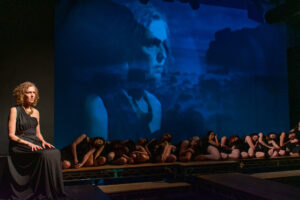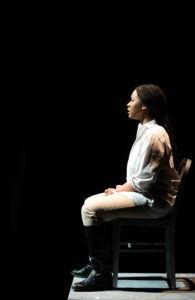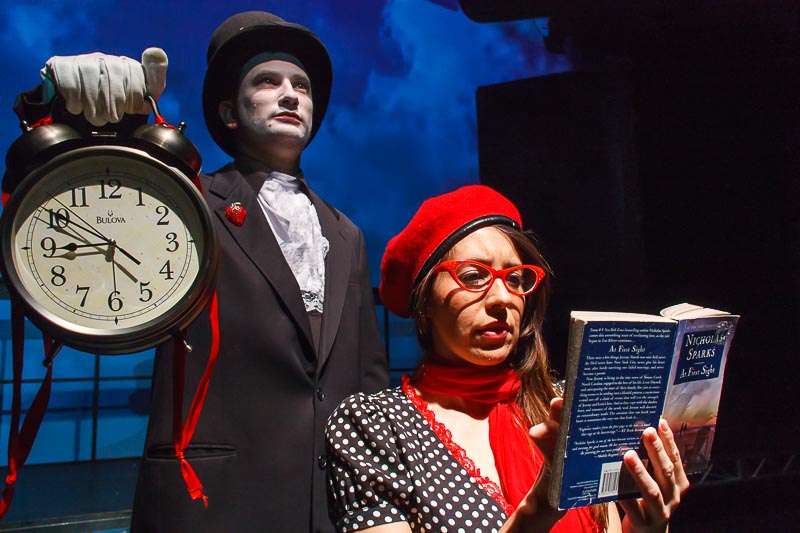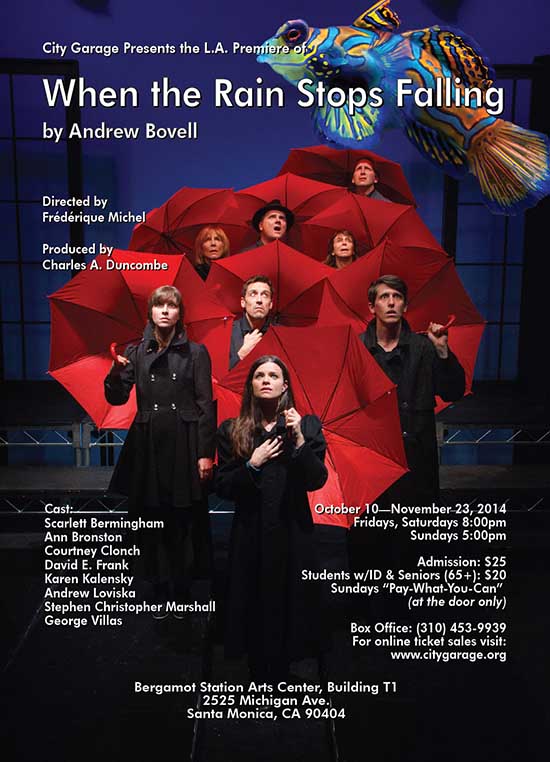Each page a victory
At whose expense the victory ball?
Every ten years a great man,
Who paid the piper?
— Brecht A Worker Reads History
Whose and who, indeed? In 2005, Margaret Atwood shook the dust off of The Odyssey and turned it to her own purpose looking at those left behind as Odysseus went off to war and wandering. The stage adaptation of The Penelopiad receives a bracing, audacious performance as Santa Monica’s City Garage returns to full swagger.
Atwood casts a gimlet eye on the great men of Sparta and Ithaca where most lives didn’t matter and all the standards were double. Her sympathies are squarely with Penelope and even moreso her maids who receive an untimely end upon Odysseus’s eventual return. The novella is set in a timeless Hades as Penelope narrates her very lonely life. In the play, she watches it unfold. Despite ostensibly high station, she is pitiable – an afterthought to all and always second fiddle to her cousin Helen. But that isn’t the generational servitude into which so many were born or taken as spoils of war. “We too were children” say the maids, “We too were born to the wrong parents. Poor parents, slave parents, peasant parents, and serf parents; parents who sold us, parents from whom we were stolen.” It snaps how little has changed through the centuries.
The all female cast of thirteen portrays twenty five roles and the adaptation is a corker. Peggy Flood is a wistful, melancholy spirit-Penelope watching Lindsay Plake relive her life. Odysseus (Emily Asher Kellis,) woos, weds, and beds her before sodding off to recover her hated cousin – “the septic bitch,” in one of many fine turns of phrase. Flood is one of two singly-cast, the rest weave in and out of a fluid, polymorphous chorus budding here as a suitor, there as a son, and collectively as a boat or an army through chant and shanty. The script is eminently suited to Frédérique Michel’s idiosyncratic style and discreetly supported by Charles Duncombe’s production design.

Peggy Flood and the cast of “The Penelopiad”
Photo by Paul Rubenstein, courtesy of City Garage Theatre
With even Telemachus (Courtney Brechemin) taken from her to be raised by a nurse (Geraldine Fuentes,) Penelope bucks tradition and her in-laws to make work and a life for herself. “Remember this – water does not resist. Water flows” said her Naiad mother (Angela Beyer) and daughter dutifully goes around obstacles she can’t go through. She takes up weaving and stewards her husband’s estate in hopes of his pleasure upon his return. Yes, she deals in slaves and selects twelve young ones for her inner circle. They do her bidding in the house, at the loom, and much, much more when the suitors arrive. The maids are her eyes, ears, and arms in keeping the youthful louts somewhat at bay through directed canoodling. When the shroud artifice goes awry, the suitors turn from mere pillaging to the rape of Penelope’s favorite, Melantho (Marissa Ruiz). In a play full of CG’s hallmark nudity, this fully clothed scene shocks. Atwood progressively ratchets the cynicism. Penelope and Helen (Marie Paquim) – both knowing how things turned out – lob barbs at each other, the latter as unrepentant and caustic in death as in life. Clever Odysseus is a conniving businessman and silver-tongued devil. The chorus snarks at his supposed heroics and marvels at his ability to avoid getting home for ten years. And, no break for the lady of the house even upon his disguised return. While she sleeps, father and son slaughter the suitors. Egged on by the nurse, they snuff the loyal maids in thanks for helping the house stave off total ruin. Isolated from birth, estranged from son and husband, Penelope can’t explain, complain, or mourn her only real family and has to accept the collateral dommage.
Although a couple of the choral interludes are a tad silly, the author’s concept and political vision come off like fine espresso – fragrant, dark, and bitter with an eye-opening kick. The adaptation omits two chapters: “Anthropology Lecture” proposing an interesting literary theory and lobbing preemptive strikes against critics would have been draggy and hard to stage. “The Trial of Odysseus” would have presented its own problems but starkly showed the man getting away with it to the horror of his victims. Then as now, justice punches down. Despite the sprawling saga, the production is a tight, symmetric two hours with intermission. “Penelopiad” was in rehearsals in March 2020 just before the world went on hold. In that time of shutdown the carpet pulled back and we saw at least briefly the countless, nameless “essential workers” risking all to make the world fit for the profiteers. Atwood performs a similar service by turning a well-worn story on its head for a different perspective. Wily Kinbote was right, it can be the underside of the weave that entrances the beholder and it is the commentator who has the last word.
Bergamot Station was alive and hopping on opening night with multiple galleries having their own events. CG’s neighbor BBAX hosted the opening of textile artist Carmen Mardonez‘s solo show. Brilliantly colored and explorable sails of cloth and yarn along with eerily humanoid sculptural shapes offered both preface and counterpoint to the equally nautical although somber play next door. The artist echoes Penelope in her statement, “As a woman, my entrails have always been governed by others.” It is one of those confluence of forms that in an ideal world would be much more frequent in an art colony. Unfortunately the galleries close up shop long before curtain leaving a mostly dark and unfestive parking lot for theatregoers. The exhibition runs through January 2023 and is worth a stop.
Youtube Channel: L.A. Art Documents
The Penelopiad
by Margaret Atwood
Directed by Frédérique Michel
for The City Garage
11 November to 18 December 2022
Friday and Saturday 8pm, Sunday 6pm
at Bergamot Station
2525 Michigan Ave, Building T1
Santa Monica, CA 90404
Admission: $30, Students/Seniors $25
Sundays “Pay What You Can” at the Door
Box Office: (310) 453-9939
or online
Running time: Two hours minutes with intermission
Masks requested but not required
Unspeakable Dreams, Smothering Desires
A solo exhibition by Carmen Mardonez
Curated by Marisa Caichiolo
12 November 2022 through January 2023
Tuesday – Friday, 11:30am – 5pm & Saturday, 12 – 6pm
at Building Bridges Art Exchange
Bergamot Station
2525 Michigan Ave, Building F2
Santa Monica, CA 90404
Free admission






